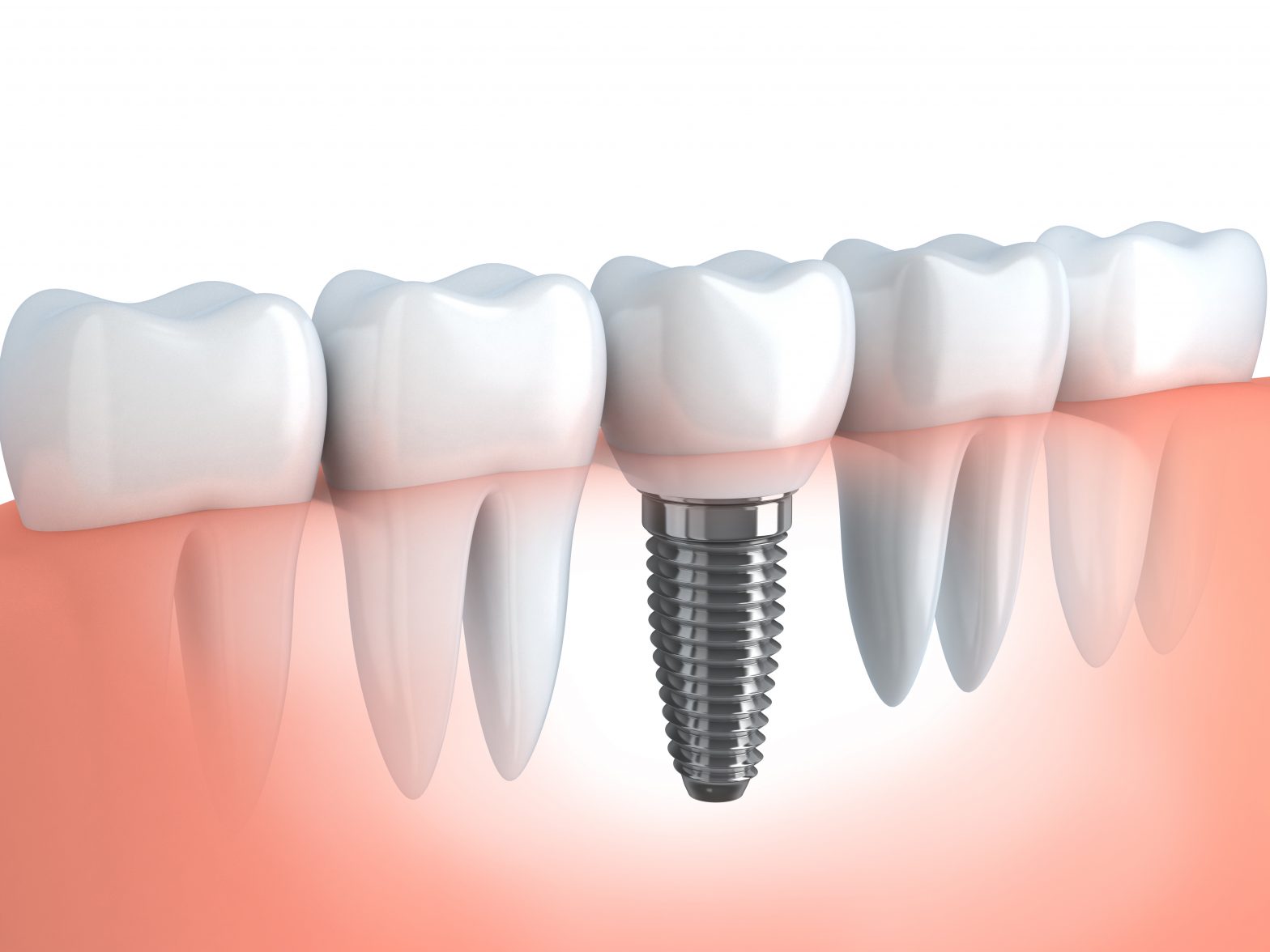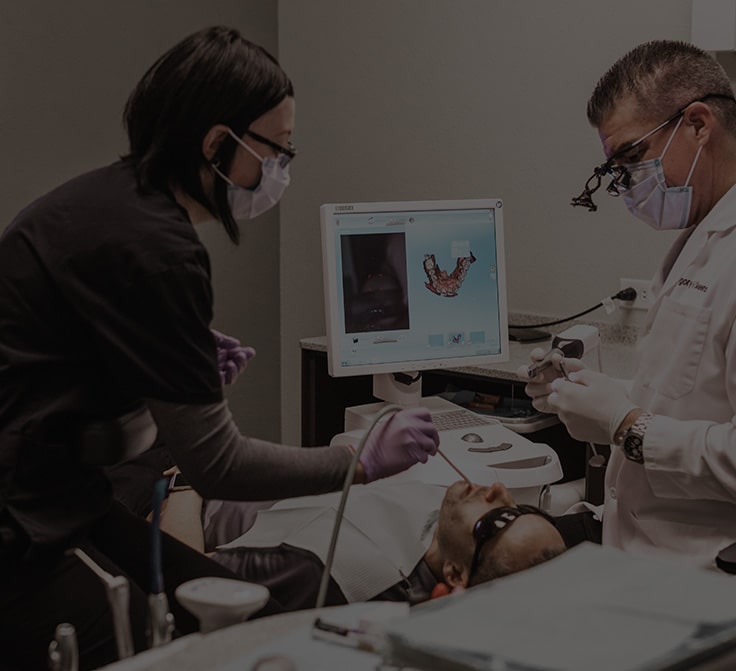
Whether you’re missing two or ten teeth, you know how miserable and embarrassing it feels to hide your smile from the world. The gaps in your mouth also make talking and chewing nearly impossible. You’ve considered dental implants, but you’re not sure if the Golden Standard in tooth replacement technology is right for you. These dental implant FAQs have all the answers you need to decide.
1. Am I a Good Candidate for Dental Implants?
There’s not a single “perfect” type of dental implant patient, but all men and women who receive dental implants need to have at least these three qualities.
Healthy Gums
If you have unhealthy gums and show signs of gum disease or periodontal disease, you may not qualify for the implant procedure. Your dentist may recommend comprehensive treatment plans like root scaling and planing or laser gum therapy to improve your gum health and make implants a viable option.
Sufficient Bone Density
The base of the dental implant is a small titanium rod that’s implanted into the jawbone. This titanium implant replaces the natural root of the tooth and attaches to the crown that’s visible along the gumline. Without enough bone density, the titanium implant won’t be adequately supported. If you don’t have enough bone density currently, you may have the option to undergo bone grafting to regrow enough bone for dental implants.
General Health
There are other health factors that could prevent you from getting implants. Heavy smokers, pregnant women, children, people with chronic diseases, and people taking steroids may not be candidates for implants. It’s possible for you to adjust your lifestyle habits in order to make dental implants an option as you pursue lasting oral health.
2. How are Dental Implants Different From Real Teeth?
The structure of a natural tooth differs from the structure of an implant, but bacteria threatens them both in the same way. A natural tooth consists of the crown, which is visible in the mouth and used for chewing, and the root, which is located beneath the gums. The connective tissue around the crown is meant to stop bacteria from moving down into the root of the tooth.
A dental implant has an artificial crown and replaces the tooth’s natural roots with a titanium implant. In this case, the connective tissue around the crown prevents bacteria from harming the implant, as it fuses with the bone and forges a permanent place in the mouth.
3. Do I Need to Care For Implants Like Normal Teeth?
Although dental implants cannot suffer from cavities and decay like real teeth, they are still vulnerable to bacteria. This is why your implant is only as healthy as the tissue surrounding it. If you neglect to brush and floss, bacteria will accumulate, infect the gums, and damage the implant. This is called peri-implantitis, and it can result in the loss of the bone that supports the implant. If not treated and resolved quickly, the implant will fail.
Overall, caring for your implants does not need to be complicated. Simply brush and floss on a regular basis to remove bacteria and eliminate any risk of peri-implantitis. You may also want to use an antimicrobial mouth rinse, disclosing tablets to stain areas of hidden plaque accumulation, and interdental brushes to remove plaque from either side of the implant.
4. What are the Best Benefits of Dental Implants?
This is one of the most important dental implant FAQs. Dental implants are considered the Gold Standard in tooth replacement for a good reason: simply put, they transform lives! There are many benefits to using dental implants, including these three.
Implants Help You Eat and Talk
Tooth loss impacts your lifestyle in many ways, especially in your ability to eat and talk without complications. Even just one lost tooth can affect pronunciation and chewing. Implants can be used to replace single or multiple teeth so you don’t have to avoid your favorite foods or avoid talking in public.
Implants Complete Your Smile
The most obvious problem created by tooth loss is your incomplete smile. Whether you lose your front teeth or bottom molar, you will feel self-conscious smiling and talking to others. Fortunately, implants replace your missing teeth to create a full, whole smile once again. Since they look natural and realistic, nobody will even suspect that tooth loss was once a problem for you.
Implants Protect Healthy Bone
Replacing your missing teeth is important for more than aesthetic and functional reasons. Each tooth in your mouth plays an important role in stimulating and strengthening underlying bone. When you lose a tooth, you lose the ability to protect healthy bone in that area.
Dental implants are able to replace the tooth’s root system to continue stimulating the jawbone. They restore the support that the jawbone needs, stimulate further bone growth, and prevent future bone loss. This is the only way to prevent bone loss over time.
5. What Are Implants Made From?
A dental implant is an artificial tooth designed to look exactly like a natural tooth that fits perfectly in your mouth. It’s composed of three individual pieces that fit together: the screw, abutment, and crown.
The implant itself is a titanium screw placed deep into your gum tissue. Over the span of a few weeks, it fuses permanently with your jawbone to replace missing tooth roots. This stimulation also supports the jaw bone and reinforces a sturdy base for the lower half of the implant.
An abutment sits on the titanium screw to connect the screw and your custom-made crown. Since the implant’s crown is the portion seen and felt, it’s customized to mimic the appearance and function of a real tooth.
6. How Can I Get Started with Dental Implants?
To learn more about dental implant FAQs, visit Dr. Skeens at Encinitas Family Dentistry in Encinitas, California. Dr. Skeens specializes in restorative dentistry procedures that use state-of-the-art technology to restore his patients’ smiles. He understands the incredible difference a full set of teeth makes in the quality of your life, and he’s here to guide you through the dental implant journey.
Call (760) 944-9288 to schedule your consultation today. Don’t let missing teeth hold you back any longer.







 LEARN MORE ABOUT OUR GUIDING PRINCIPLES AT ENCINITAS FAMILY DENTISTRY
At our core, Encinitas Dentistry is a dental practice devoted to restoring and enhancing the natural beauty of your smile. How we accomplish that goal is what makes us stand out. We mingle time-tested approaches to oral care with state-of-the-art technology and procedures to deliver beautiful, long-lasting smiles!
LEARN MORE ABOUT OUR GUIDING PRINCIPLES AT ENCINITAS FAMILY DENTISTRY
At our core, Encinitas Dentistry is a dental practice devoted to restoring and enhancing the natural beauty of your smile. How we accomplish that goal is what makes us stand out. We mingle time-tested approaches to oral care with state-of-the-art technology and procedures to deliver beautiful, long-lasting smiles!